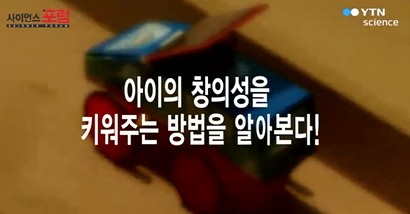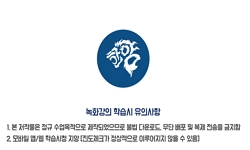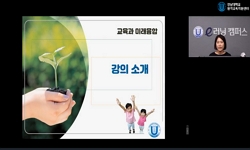The South Korean Ministry of Education has decided to add Character Education as a mandatory curricular requirement in teachers’ colleges, starting in 2017. The rationale behind this is that ‘character’ must be the basis for all educational acti...
http://chineseinput.net/에서 pinyin(병음)방식으로 중국어를 변환할 수 있습니다.
변환된 중국어를 복사하여 사용하시면 됩니다.
- 中文 을 입력하시려면 zhongwen을 입력하시고 space를누르시면됩니다.
- 北京 을 입력하시려면 beijing을 입력하시고 space를 누르시면 됩니다.

인성교육의 종교적 가치와 잠재적 교육과정을 통한 실천 = The Religious Value of Character Education and it’s Application through Hidden Curriculum
한글로보기부가정보
다국어 초록 (Multilingual Abstract)
The South Korean Ministry of Education has decided to add Character Education as a mandatory curricular requirement in teachers’ colleges, starting in 2017. The rationale behind this is that ‘character’ must be the basis for all educational activities before one actually teaches and learns in a school environment. In all spheres of education intended for the well-rounded development of the learner, including cognitive, emotional, spiritual and religious education, a common denominator called Character Education has been postulated. However, the reality is that, due to the Municipal Law on Student Human Rights, it is becoming harder for teachers to have authority over the student, and with the ongoing erosion of the family unit within society, it has now become difficult to educate humanness and character through informal means like in the past. Primarily, this study looks for clues to combine ‘Moral or Ethics’ with ‘Religious Education’ by introducing the philosophies of E. Durkheim, who asserted that character developments within an individual can act as a center point for social order and harmony, as well as O. Reboul, who claimed that all kinds of educational activities include some form of sacred ‘Value.’ Secondly, this study suggests methods for the practical implementation of Webb-Mitchell’s ‘Gestural Pedagogy,’ a type of implicit educational theory, assuming that changes in the student’s attitude/ values is more effectively and sustainably demonstrated through a ‘Hidden Curriculum’ Approach than through the ‘Explicit Curriculum’ of official class hours settings.
국문 초록 (Abstract)
대한민국 교육부에서는 2017년부터 교육대학교과 사범대학의 커리큘럼에 ‘인성’ 과목을 필수로 이수하도록 정하였다. 왜냐하면 학교에서 가르치고, 배우기에 앞서 인간의 ‘됨됨이’는 ...
대한민국 교육부에서는 2017년부터 교육대학교과 사범대학의 커리큘럼에 ‘인성’ 과목을 필수로 이수하도록 정하였다. 왜냐하면 학교에서 가르치고, 배우기에 앞서 인간의 ‘됨됨이’는 모든 교육활동의 근간이 되어야하기 때문이다. 즉, 한 학습자의 온전한 성장발달을 이루려면 인지적, 정서적, 도덕적, 종교적 영역 등 모든 측면이 고려되어야 하며, 이 교육적지원들은 ‘인성교육’이라는 공통분모에 기초해야 한다. 그럼에도 불구하고 한국의 교육현실은 ‘학생인권 조례법’에 의해 학생에 대한 교사의 권위가 발휘되기 힘들어지고, 또한 사회적으로도 가정이 붕괴되는 현상으로 인해 그 동안 비형식적으로 이루어지던 인간됨을 위한 교육은 기대하기 어려워졌다. 그렇다면, 사람의 됨됨이, 인격, 성품, 성격을 의미하는‘인성’은 어떠한 접근으로 개발될 수 있을까? 이 연구는 첫째, 개인적 품성의 변화가 사회적 질서와 화합을 위한 ‘종교적 구심점’이 될 수 있다고주장한 듀르깽(E. Durkheim)과, 모든 교육활동에는 어떤 성스러운 ‘가치’가 포함된다는 흐블(O. Reboul)의 철학을 소개함으로써 ‘도덕 ‧ 윤리교육’과 ‘종교교육’을 통합할 수 있는 단초를 찾고자 한다. 둘째, 이 연구는 학생들의 태도나 가치관의 변화는 공식적인 수업시간에 배우도록 ‘표면화된 교육과정’을 통하기 보다는, ‘잠재적 교육과정의 접근방식’을 통해서 보다 지속력 있게 또 효과적으로 발휘된다는 전제 하에 그 암묵적교육원리 중 하나인 웹 미첼(Webb-Mitchell)의 ‘몸짓의 페다고지’를적용하는 실천방안을 제안한다.
참고문헌 (Reference)
1 교육과학기술부, "창의와 배려의 조화를 통한 인재육성-창의 ‧ 인성교육 기본방안" 2009
2 여성훈, "종교교육에 있어서 Hidden Curriculum의 의미와 그 미래로서의 미시 종교교육학" 4 : 169-192, 1999
3 정진홍, "제7차 교육과정과 종교교육" 13 : 3-42, 2001
4 배지현, "잠재적 교육과정의 재개념화를 위한 잠재적 교육과정 이론에 대한 평가" 한국교육과정학회 31 (31): 1-27, 2013
5 이은진, "인성교육에 대한 인식과 실태" 한국종교교육학회 38 : 25-53, 2012
6 배상식, "인성교육에 대한 교사와 학부모들의 인식 및 실태" 33 (33): 57-76, 2012
7 박상진, "비기독교학교에서 종교교육을 통한 학원선교" 29 : 239-274, 2007
8 남은경, "기독교여자대학교의 교육이념이 비기독교인 학생의 가치관 형성에 미친 영향 - E여대생의 대학생활 경험에 관한 내러티브 의미 탐구" 기독교신학연구소 (46) : 373-405, 2015
9 한상진, "교회교육을 위한 인성교육의 중요성" 한국기독교교육학회 (40) : 167-197, 2014
10 McNeil, J. D., "교육과정의 이해" 학지사 2002
1 교육과학기술부, "창의와 배려의 조화를 통한 인재육성-창의 ‧ 인성교육 기본방안" 2009
2 여성훈, "종교교육에 있어서 Hidden Curriculum의 의미와 그 미래로서의 미시 종교교육학" 4 : 169-192, 1999
3 정진홍, "제7차 교육과정과 종교교육" 13 : 3-42, 2001
4 배지현, "잠재적 교육과정의 재개념화를 위한 잠재적 교육과정 이론에 대한 평가" 한국교육과정학회 31 (31): 1-27, 2013
5 이은진, "인성교육에 대한 인식과 실태" 한국종교교육학회 38 : 25-53, 2012
6 배상식, "인성교육에 대한 교사와 학부모들의 인식 및 실태" 33 (33): 57-76, 2012
7 박상진, "비기독교학교에서 종교교육을 통한 학원선교" 29 : 239-274, 2007
8 남은경, "기독교여자대학교의 교육이념이 비기독교인 학생의 가치관 형성에 미친 영향 - E여대생의 대학생활 경험에 관한 내러티브 의미 탐구" 기독교신학연구소 (46) : 373-405, 2015
9 한상진, "교회교육을 위한 인성교육의 중요성" 한국기독교교육학회 (40) : 167-197, 2014
10 McNeil, J. D., "교육과정의 이해" 학지사 2002
11 Giroux, H. A., "교육과정논쟁: 교육과정의 사회학" 집문당 1988
12 길형석, "교육과정과 교육평가" 동문사 2003
13 박휴용, "교육과정" 학지사 2012
14 현영옥, "고등학교 현장이해와 목회적용" 서울신학대학교 2015
15 이인숙, "가정과 교사의 창의・인성 교육에 대한 관심과 실행에 대한 인식 - CBAM 모형에 기초하여-" 한국가정과교육학회 24 (24): 117-134, 2012
16 Westerhoff III, J. H., "Values for tomorrow’s children" Pilgrim Press 1971
17 Deneys-Tunney, A., "Un autre Jean-Jaques Rousseau: Le paradoxe de la technique" P. U. F 2010
18 Blevins, D., "Transformational teaching insights from neuroscience" 10 (10): 407-423, 2013
19 Dimitraidis, G., "Theory for education" Routledge 2006
20 Yoder, J. H., "The politics of Jesus" Eerdmans Pub. Co 1972
21 Merriam, S. B., "The new update on adult learning theory" Jossey-Bass 2001
22 Jachim, N, "The hidden curriculum" 44 (44): 83-85, 1987
23 Moran, G., "Speaking of teaching: Lessons from history" Rowman & Littlefield Pub. Inc 2008
24 Matthai, S. H., "Rethinking faith formation" 99 (99): 56-70, 2004
25 Reboul, O., "Qu’est-ce qu’apprendre?" PUF 1995
26 Alain, "Propos sur l’éducation suivie de Pédagogie enfantine" PUF 1995
27 Dumestre, M. J., "Postfundamentalism and the Christian international learning community" 90 (90): 190-206, 1995
28 Westerhoff III, J. H., "On the threshold of God’s future" Harper & Row Pub 1986
29 Campagne, P., "Mouvements d’une pensée: Pierre Bourdieu" BORDAS 2004
30 Rosenbaum, J. E., "Making inequality: The hidden curriculum of high school tracking" John Wiley & Sons 1976
31 Durkheim, E., "L’éducation morale" PUF 1992
32 Jackson, P. W., "Life in classrooms" Holt, Rinehart and Winston Inc 1968
33 Brelsford, T., "Lessons for leligious education from cognitive science of religion" 100 (100): 174-191, 2005
34 Reboul, O., "Les valeurs de l’éducation" PUF 1992
35 Schwartz, S. H., "Les valeurs de base de la personne: théorie, mesures et applications" 47 (47): 929-968, 2006
36 Cabanel, P., "Les protestants, l’école et la laïcité, XVIIIe-XXe siècles: De Luther à la loi Debré" 110 : 5-21, 2006
37 Resweber, J.-P., "La relation d’enseignement" C.E.F.E.A. 1989
38 Arendt, H., "La crise de l’éducation" Folio 1991
39 Obadia, L., "Is Durkheim’s ‘sociologism’ out-dated? Debating ‘individualism’ in contemporary French sociology of religion" 39 (39): 547-564, 2014
40 Rousseau, J.-J, "Emile ou de l’éducation" Garnier-Flammarion 1966
41 Durkheim, E., "Education et sociologie" PUF 1997
42 Bouveresse, R., "Education et philosophie: Ecrits en l’honneur d’Olivier Reboul" PUF 1993
43 손경원, "E. Durkheim의 도덕교육: 다원화 사회에서의 적용가능성과 그 한계" 14 : 59-90, 2004
44 Sadovnik, A. R., "Durkheim and modern education" Routledge 1998
45 Illich, I., "Deschooling society" Marion Boyars Publishers 1971
46 Illeris, K., "Contemporary theories of learning: Learning theorists... in their own words" Routledge 2009
47 Webb-Mitchell, B. P., "Christly gestures: Learning to be members of the body of Christ" Wm. B. Eerdmans Publishing 2003
48 Sutrop, M., "Can values be thaught?: The myth of value-free education" 19 (19): 189-202, 2015
49 Coe, G. A., "A social theory of religious education" Charles Scribner’s Sons 1921
동일학술지(권/호) 다른 논문
-
- 한국기독교교육학회
- 김정준
- 2015
- KCI등재
-
- 한국기독교교육학회
- 박상진
- 2015
- KCI등재
-
- 한국기독교교육학회
- 이정관
- 2015
- KCI등재
-
기독교 유아 홈스쿨링 교육과정 분석: 밥 존스, 알파오메가, 크리스천 리버티를 중심으로
- 한국기독교교육학회
- 유희진
- 2015
- KCI등재
분석정보
인용정보 인용지수 설명보기
학술지 이력
| 연월일 | 이력구분 | 이력상세 | 등재구분 |
|---|---|---|---|
| 2022 | 평가예정 | 재인증평가 신청대상 (재인증) | |
| 2019-01-01 | 평가 | 등재학술지 유지 (계속평가) |  |
| 2016-01-01 | 평가 | 등재학술지 유지 (계속평가) |  |
| 2015-03-31 | 학회명변경 | 영문명 : The Korean Society Of Christian Education -> The Korean Society of Christian Religious Education |  |
| 2014-12-31 | 학술지명변경 | 외국어명 : A Journal of Christian Education in Korea -> Journal of Christian Education in Korea |  |
| 2012-01-01 | 평가 | 등재 1차 FAIL (등재유지) |  |
| 2009-01-01 | 평가 | 등재학술지 선정 (등재후보2차) |  |
| 2008-01-01 | 평가 | 등재후보 1차 PASS (등재후보1차) |  |
| 2006-06-30 | 학회명변경 | 영문명 : The Korean Society Of Christian Education -> The Korea Society for the Study of Christian Religious Education |  |
| 2006-06-21 | 학회명변경 | 영문명 : The Korean Society Of Christian Education -> The Korean Society for the Study of Christian Religious Education |  |
| 2006-01-01 | 평가 | 등재후보학술지 선정 (신규평가) |  |
학술지 인용정보
| 기준연도 | WOS-KCI 통합IF(2년) | KCIF(2년) | KCIF(3년) |
|---|---|---|---|
| 2016 | 1.22 | 1.22 | 1.12 |
| KCIF(4년) | KCIF(5년) | 중심성지수(3년) | 즉시성지수 |
| 0.96 | 0.87 | 1.101 | 0.15 |




 스콜라
스콜라






